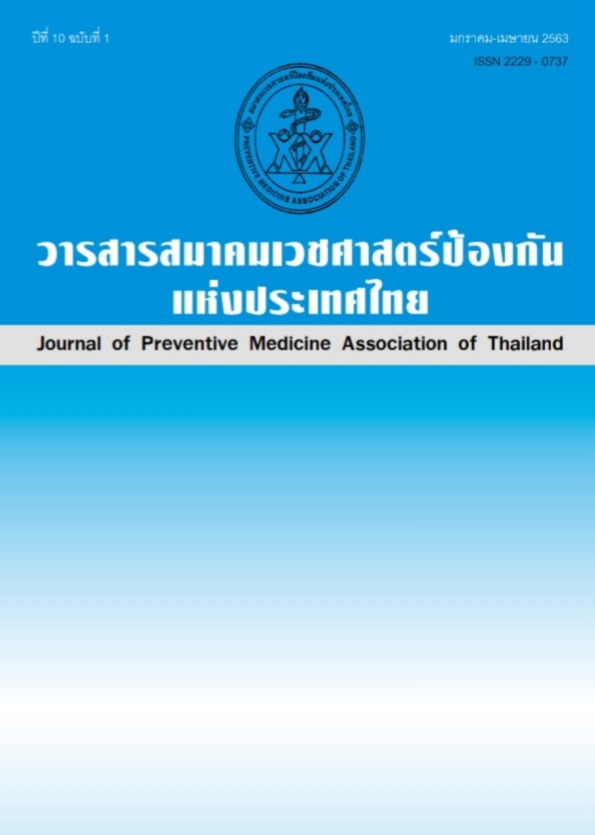The Development of Health Literacy Promoting Model of Colorectal Cancer Patients Receiving Chemotherapy
Keywords:
model development, health literacy, colorectal cancer patients, chemotherapyAbstract
The objectives of this research and development were to 1) study health literacy of colorectal cancer patients receiving chemotherapy 2) study situation of promoting health literacy in colorectal cancer patients receiving chemotherapy 3) develop the pattern of health literacy promoting model of colorectal cancer patients receiving chemotherapy, and 4) study the effectiveness of health literacy promoting model of colorectal cancer patients
receiving chemotherapy in Jainadnarendra Hospital. The research was divided into 4 steps including: 1) survey of health literacy of colorectal cancer patients receiving chemotherapy. Sample was 70 colorectal cancer patients receiving chemotherapy. The research instrument used was a questionnaire. The data was analyzed by descriptive statistics; 2) study of situation promoting health literacy in colorectal cancer patients receiving chemotherapy.
Focus group discussion was conducted among 9 informants. Data were analyzed using content analysis; 3) developing the health literacy promoting model of colorectal cancer patients receiving chemotherapy. The researcher used the findings from the first, and the second step to develop the health literacy promoting model namely SMILE model; 4) study the effectiveness of the SMILE model. Sample was 60 colorectal cancer patients receiving chemotherapy. The research instruments were the SMILE model, and the questionnaire regarding health literacy. Data were analyzed using Paired t-test. The results revealed as follows;
1. Overall, colorectal cancer patients receiving chemotherapy had health literacy at
low level. (M=48.51, S.D.=7.32)
2. Situations of promoting health literacy in colorectal cancer patients receiving
chemotherapy included lack of 1) integrating health literacy promoting with work 2) model
or activity, and 3) monitoring and evaluation of health literacy that is clear and continuous.
3. The SMILE model included 1) S: Survey, 2) M: Meeting, 3) I: Implementation 4) L: Learning, and 5) E: Evaluation
4. After using the SMILE model, the experimental group had health literacy higher than before using the model and higher than control group with statistical significance (p<.01)
References
2. ประเสริฐ อัสสันตชัย, บรรณาธิการ. การพยาบาลผู้ใหญ่และผู้สูงอายุที่มีปัญหาสุขภาพ. กรงเทพฯ: ไอกรุ๊ป เพรส; 2553.
3. โรงพยาบาลชัยนาทนเรนทร. สถิติผู้ป่วยมะเร็งลำไส้ใหญ่และทวารหนัก. ชัยนาท: โรงพยาบาลชัยนาทนเรนทร; 2561.
4. อัศนี วันชัย, ปิยะเนตร วิริยะปราโมทย์, นงนุช ปัญจธรรมเจริญ, ลักคณา บุญมี. ความรอบรู้ทางสุขภาพของผู้ป่วยมะเร็งที่ใช้การแพทย์เสริมและทางเลือก. วารสารพยาบาลสงขลานครินทร์ 2562;39:149-57.
5. Nutbeam D. The evolving concept of health literacy. Soc Sci Med 2008;67:2072-8.
6. กองสุขศึกษา กรมสนับสนุนบริการสุขภาพ. การเสริมสร้างและประเมินความรอบรู้ด้านสุขภาพและพฤติกรรมสุขภาพ. นนทบุรี: กองสุขศึกษา กรมสนับสนุนบริการสุขภาพ กระทรวงสาธารณสุข; 2561.
7. รุ่งนภา อาระหัง. ผลของโปรแกรมการส่งเสริมความรอบรู้ด้านสุขภาพต่อพฤติกรรมการป้องกันโรคความดันโลหิตสูงสำหรับกลุ่มเสี่ยงโรคความดันโลหิตสูงที่ชุมชนแห่งหนึ่งในจังหวัดนครปฐม. [วิทยานิพนธ์ปริญญาพยาบาลศาสตรมหาบัณฑิต]. กรุงเทพฯ: มหาวิทยาลัยคริสเตียน; 2560.
8. Crabtree BF, Miller WL. Doing Qualitative Research. London: SAGE Publications; 1992.
9. ชาตรี แมตสี่, ศิวิไลซ์ วนรัตน์วิจิตร. การสร้างเสริมความรอบรู้ด้านสุขภาพ: จากแนวคิดสู่การปฏิบัติ. วารสารวิทยาลัยพยาบาลบรมราชชนนี อุตรดิตถ์ 2560;9:96-111.
10. ประภาศรี ภูมิถาวร, นงพิมล นิมิตรอานันท์, ศศิธร รุจนเวช. ผลของโปรแกรมการส่งเสริมความฉลาดทางสุขภาพสำหรับนักเรียนระดับประถมศึกษาที่มีภาวะน้ำหนักตัวเกิน. วารสารโรงพยาบาลชลบุรี 2560;42:169-78.
11. Taggart J, Williams A, Dennis S, Newall A, Shortus T, Zwar N, et al. A systematic review of interventions in primary care to improve health literacy for chronic disease behavioral risk factors (serial online) 2012. (cited 2019 May 25). Available from: http://www.biomedcentral.com/11471-2296/13/49/prepub.
Downloads
Published
How to Cite
Issue
Section
License
บทความที่ลงพิมพ์ในวารสารเวชศาสตร์ป้องกันแห่งประเทศไทย ถือเป็นผลงานวิชาการ งานวิจัย วิเคราะห์ วิจารณ์ เป็นความเห็นส่วนตัวของผู้นิพนธ์ กองบรรณาธิการไม่จำเป็นต้องเห็นด้วยเสมอไปและผู้นิพนธ์จะต้องรับผิดชอบต่อบทความของตนเอง






